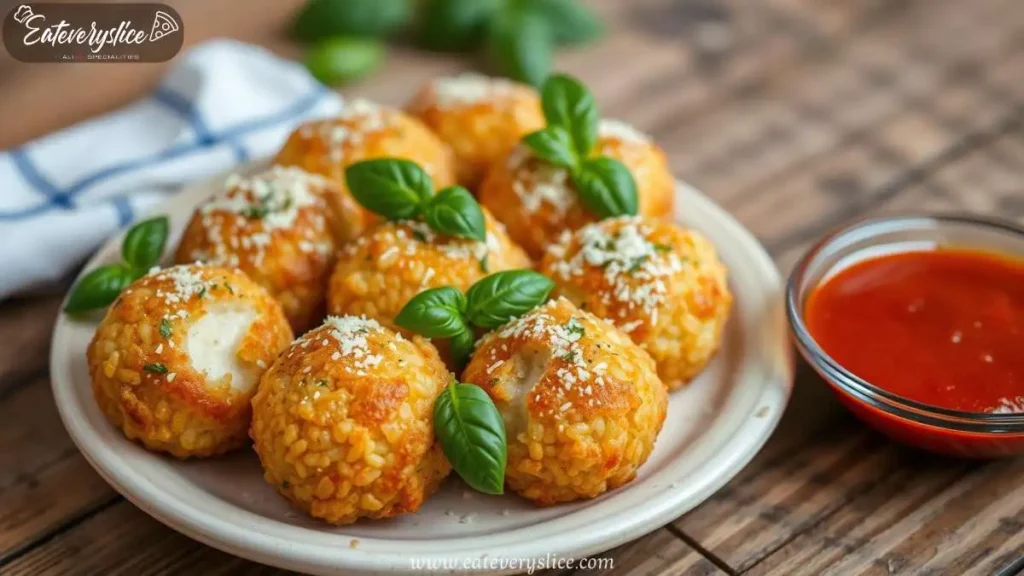Last updated on March 30th, 2025 at 07:27 am
Table of Contents
Making your own Italian seasoning is a great way to boost your cooking skills. This mix of herbs and spices can turn simple dishes into delicious Italian classics. It’s perfect for both experienced chefs and home cooks wanting to add an Italian touch.
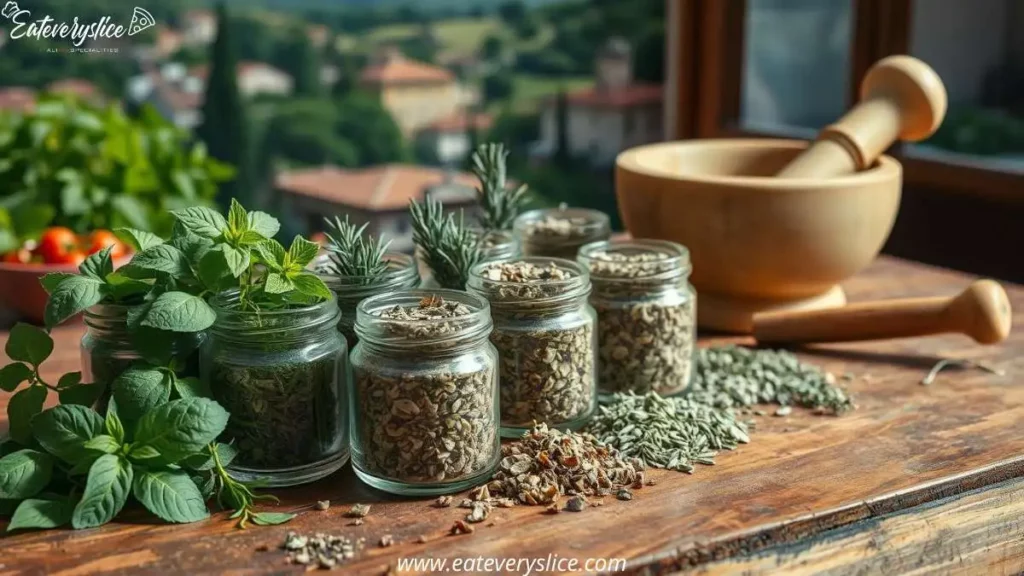
This guide will cover the history and uses of Italian seasoning. We’ll also talk about why making your own is a good idea. You’ll learn how to mix the perfect blend, from choosing ingredients to storing them right.
Key Takeaways
- Homemade Italian seasoning is a versatile and cost-effective way to enhance your cooking
- Understanding the traditional uses and benefits of Italian seasoning will help you create the perfect blend
- Proper measuring and blending techniques are key to achieving the best results
- Storing your homemade Italian seasoning properly can preserve its freshness and flavor
- Utilizing your homemade blend in creative ways will elevate your culinary skills
Understanding the Classic Italian Seasoning Blend
Italian seasoning is a favorite in many homes, adding flavor to various dishes. Ever wondered about its origins and traditional uses? Let’s explore what’s in italian seasoning and why making your own recipe for italian seasoning can change your cooking game.
Origins and Traditional Uses in Italian Cuisine
The history of Italian seasoning goes back to the Mediterranean. There, herbs and spices have been used for ages to flavor Italian dishes. This blend is key in Italian cooking, from pasta sauces to roasted veggies.
Benefits of Making Your Own Blend
While store-bought Italian seasoning is easy to find, making your own has perks. You can adjust the herbs to your liking, creating a more balanced flavor. Plus, homemade what’s in italian seasoning lets you use fresh, high-quality ingredients for a more vibrant taste.
Essential vs Optional Herbs
- The core herbs in a recipe for italian seasoning are oregano, basil, rosemary, and thyme. These are the heart of Italian cooking.
- You can also add herbs like marjoram, sage, or fennel seeds to make it your own. These additional ingredients add layers of flavor and complexity to the seasoning blend.
Whether you’re an experienced cook or new to Italian cuisine, knowing about what’s in italian seasoning can take your dishes to the next level. Embrace this classic blend and let your culinary imagination run wild.
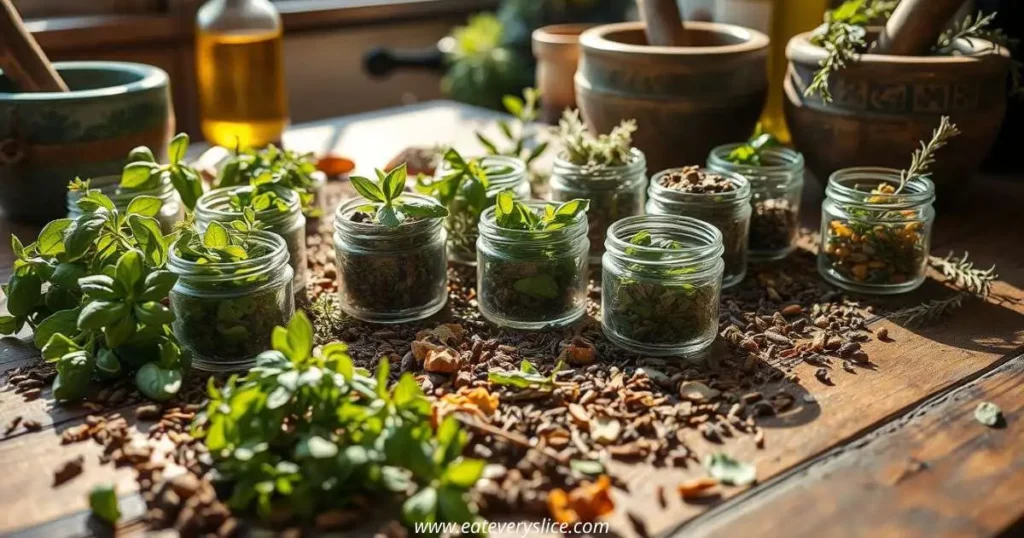
Essential Ingredients for Italian Seasoning Recipe
Making a tasty homemade italian seasoning blend begins with picking the right herbs and spices. Whether you’re a seasoned chef or a budding home cook, understanding the core ingredients is vital. It helps you make the perfect italian seasoning recipe.
The heart of a true Italian seasoning mix includes basil, oregano, and thyme. These herbs bring a rich flavor and capture the spirit of Italian cooking.
- Basil: It adds a sweet, slightly peppery taste, essential in many Italian dishes.
- Whether you’re a seasoned chef or a budding home cook, understanding the core ingredients is vital.
- Thyme: With its woodsy, lemony taste, thyme goes well with many Italian recipes.
While these herbs are the base, you can also add other ingredients to enrich your homemade italian seasoning. Some favorites include:
- Rosemary: Its strong, pine-like scent is great with rich Italian meals.
- Fennel seeds: They add a subtle licorice flavor, making your blend more complex.
- Garlic powder: A bit of garlic powder can boost the savory taste in your italian seasoning recipe.
It’s vital to use top-notch, dried herbs for the best flavor and aroma. With the right mix of essential and optional ingredients, you’ll make a versatile homemade italian seasoning. This will take your Italian cooking to the next level of flavor and authenticity.
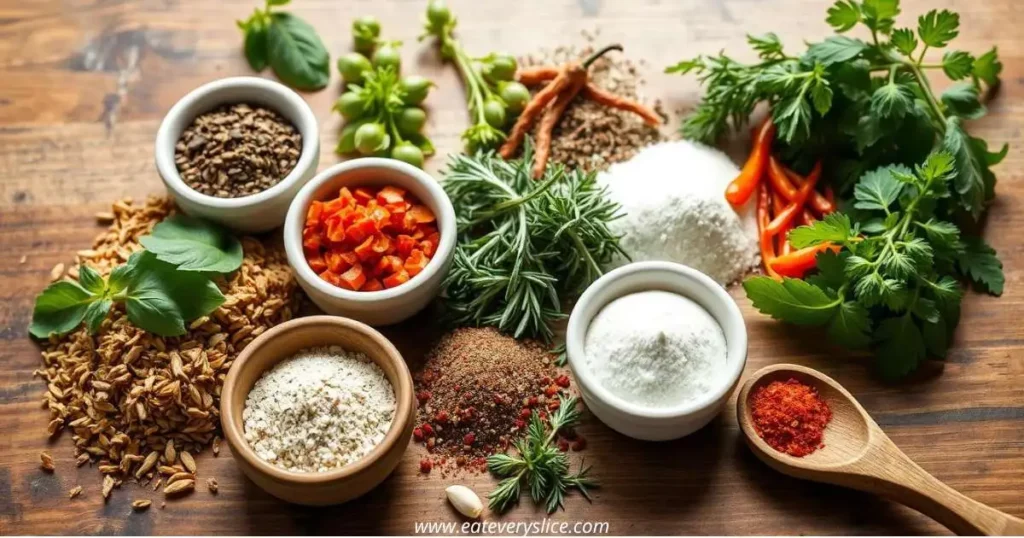
Step-by-Step Mixing Process and Storage Tips
Making the perfect how to make italian seasoning or recipe for italian seasoning at home is about mixing well and storing right. Let’s explore how to keep your homemade Italian seasoning fresh and flavorful.
Proper Measuring Techniques
Getting the right amounts is crucial when making your own Italian seasoning. First, collect all the dried herbs and spices you need. Use measuring spoons to precisely measure each ingredient for consistent results. This ensures your seasoning blend is balanced and full of flavor.
Blending Methods for Best Results
After measuring, it’s time to mix the ingredients. For the best taste, grind the herbs and spices finely. You can grind the spices using either a spice grinder or a traditional mortar and pestle. If you don’t have these tools, a bowl and whisk will work too.
Storage Solutions for Maximum Freshness
- Put your homemade Italian seasoning in an airtight container, like a glass jar or a resealable bag.
- Store it in a cool, dark spot, away from sunlight and heat.
- Use your seasoning within 6 months for the best taste.
By following these steps, you can make a how to make italian seasoning or recipe for italian seasoning that’s delicious and stays fresh. Enjoy using your homemade Italian seasoning in your cooking!
Creative Ways to Use Homemade Italian Seasoning
Your homemade Italian seasoning is more than just for pasta and pizza. Try it in marinades for meats, fish, or tofu. It’s also great on roasted veggies or in salad dressings. The uses are endless!
Want to spice up taco night? Mix your Italian seasoning into ground beef or turkey. You can also season breadcrumbs for baked chicken or pork chops. Every bite offers a delightful taste of authentic Italian cuisine.
But it’s not just for savory dishes. Add it to sweet treats like cookies, cakes, or ice cream. The herbal notes can balance out the sweetness. It’s a fun way to mix things up in your desserts.
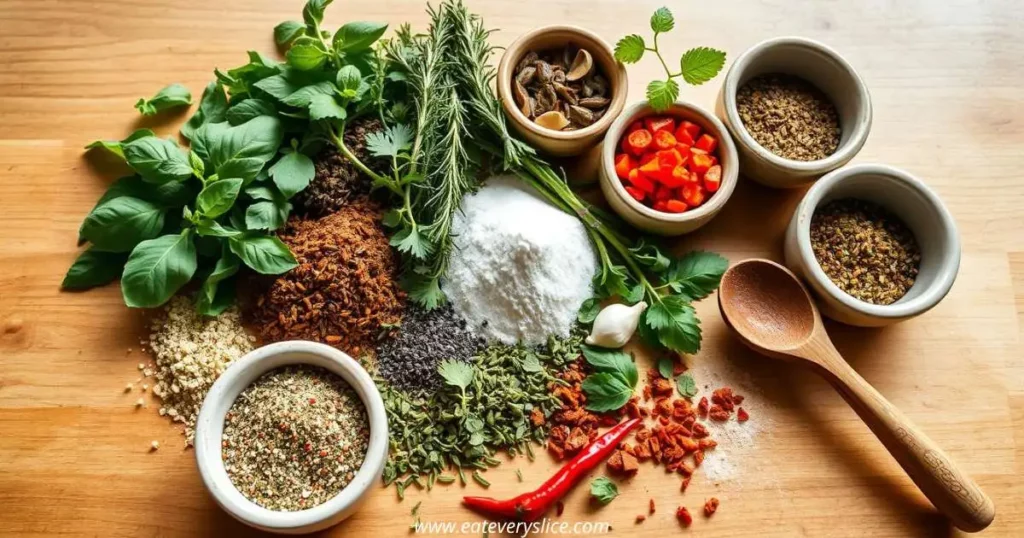
FAQ
What is Italian seasoning and what ingredients are in it?
Italian seasoning is a mix of dried herbs used in Italian cooking. It usually includes basil, oregano, rosemary, thyme, and marjoram.
What are the benefits of making your own Italian seasoning blend at home?
Making your own Italian seasoning lets you tailor it to your taste. You can change the herb ratios, add spices, and use fresh ingredients.
What are the essential herbs in an Italian seasoning mix?
The key herbs in Italian seasoning are dried basil, oregano, and rosemary. These herbs create the classic Italian taste.
How do I properly measure and mix the ingredients for homemade Italian seasoning?
To make your own Italian seasoning, measure the herbs carefully and use dried ones. Mix them in a bowl or jar, then stir or shake well.
How should I store my homemade Italian seasoning to keep it fresh?
Keep your homemade Italian seasoning fresh by storing it in an airtight container. Keep it away from sunlight and heat. Store your seasoning in a cool, dark location to maintain its freshness for several months.
How can I use my homemade Italian seasoning beyond just pasta and pizza?
Your homemade Italian seasoning is great for many dishes. Use it in marinades, salad dressings, on roasted veggies, or as a meat or fish seasoning.
